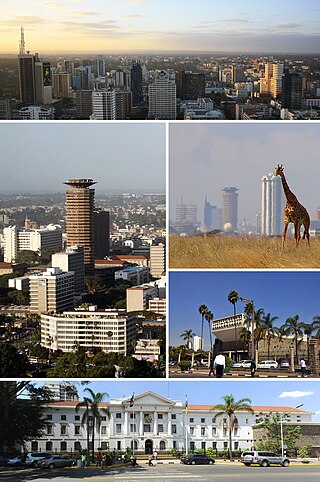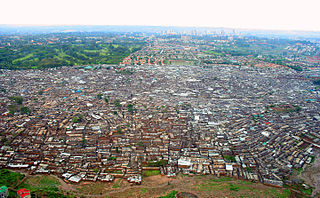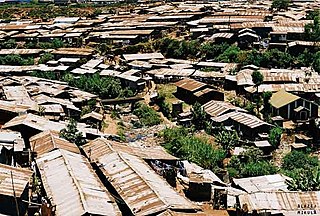
Nairobi is the capital and largest city of Kenya. The name is derived from the Maasai phrase Enkare Nairobi, which translates to 'place of cool waters', a reference to the Nairobi River which flows through the city. The city proper had a population of 4,397,073 in the 2019 census. The city is commonly referred to as The Green City in the Sun.

Kibera is a division and neighbourhood of Nairobi, Kenya, 6.6 kilometres (4.1 mi) from the city centre. Kibera is the largest slum in Nairobi, and the largest urban slum in Africa. The 2009 Kenya Population and Housing Census reports Kibera's population as 170,070, contrary to previous estimates of one or two million people. Other sources suggest the total Kibera population may be 500,000 to well over 1,000,000 depending on which slums are included in defining Kibera.

John Burdette Gage is a retired computer scientist and technology executive. He was the 21st employee of Sun Microsystems, where he is credited with creating the phrase The Network is the Computer. He served as Sun's vice president and chief researcher and director of the Science Office, until leaving on June 9, 2008, to join Kleiner Perkins Caufield & Byers as a partner to work on green technologies for global warming; he departed KPCB in 2010 to apply what he had learned "to broader issues in other parts of the world".

Founded in 2001 by Rye Barcott, Salim Mohamed, and the late Tabitha Atieno Festo, CFK Africa is an international non-governmental organization (NGO) based in the informal settlement of Kibera in Nairobi, Kenya. Registered as an NGO in Kenya and a 501(c)(3) in the US, CFK Africa is a pioneer of grassroots participatory development, and leads a community-based sports program, girls' empowerment centre, medical clinic, maternity centre, nutrition centre, young health and wellness centre, community-health outreach program, scholarship program, entrepreneurship and economic development initiatives, and a research-based initiative to improve educational quality in informal schools in Kibera. FK Africa is also an affiliated entity at the University of North Carolina at Chapel Hill and has an office at the university.

Mathare is a collection of slums in Nairobi with a population of approximately 500,000 people; the population of Mathare Valley alone, the oldest of the slums that make up Mathare, is 180,000 people. Mathare is the home of football teams Mathare United and Real Mathare of the MYSA. Mathare is currently part of two electoral constituencies; the titular Mathare Constituency and the northern part being in Ruaraka Constituency. The northern part was initially part of Kasarani Constituency up to the 2013 elections when Kasarani was split into three electoral constituencies; Ruaraka being among them. The southern part was domiciled in Starehe Constituency.
Kibera Kid is a short film set in the Kibera slums in Nairobi, Kenya. It was written, directed and co-produced by Nathan Collett in collaboration with the locals of Kibera.

Nathan Collett is a filmmaker based in Nairobi, Kenya.

Hot Sun Foundation is a non-profit organization that works in Nairobi, Kenya with young people from urban slums and other marginalized communities of East Africa to train and expose their talents and potential on the world stage. Hot Sun Foundation trains youth in all aspects of filmmaking, from scriptwriting, camera, sound, pre production, budgeting, production, directing, editing, and marketing. Vision of Hot Sun Foundation: Social transformation through art and media Mission of Hot Sun Foundation: Identify and develop youth talent to tell their stories on film

Korogocho is one of the largest slum neighbourhoods of Nairobi, Kenya. Home to 150,000 to 200,000 people pressed into 1.5 square kilometres, northeast of the city centre, Korogocho was founded as a shanty town on the then outskirts of the city.
Kawangware is a low income residential area in Nairobi, Kenya, about 15 km west of the city centre, between Lavington and Dagoretti.

Katherine Emily Holt is a British photojournalist, who works primarily across Africa and the Middle East to gather humanitarian and development stories for NGOs and private companies, as well as the UK and global media. She is also the director of communications agency, Arete.
Kisumu Ndogo is a name given to "villages" that are part of two informal settlements in Nairobi, Kenya, Kibera and Korogocho. Kisumu Ndogo means little Kisumu. Most dwellers of these villages are believed to be of low income. Nowadays, there are many villages across the country called Kisumu Ndogo. for example, there are in fact two Kisumu Ndogo villages in Kilifi county alone, one in Malindi sub county and one in Kilifi North sub county. There is also one in Mombasa and Nakuru Counties.
The following is a timeline of the history of the city of Nairobi, Kenya.

The Hult Prize is an annual competition for ideas solving pressing social issues, such as food security, water access, energy, and education. Named for Bertil Hult, the prize is awarded to college students, and has referred to as the "Nobel Prize for students".
Shining Hope for Communities (SHOFCO) is a grassroots movement based in Nairobi, Kenya in urban slums providing services, community advocacy platforms, and education and leadership development for women and girls. SHOFCO serves more than 350,000 urban slum dwellers in 10 slums across three cities in Kenya.

Mukuru is a collection of slums in the city of Nairobi. It is approximately 7 kilometres (4.3 mi) south of the central business district of Nairobi. It is one of the largest slums in Nairobi. It stretches along the Nairobi–Ngong River, situated on waste lands in the industrial area of the city between the Outering Ring Road, North Airport Road and Mombasa Road. Mukuru is among other major slums in Nairobi such: Korogocho, Kibera and Mathare.

Tunapanda Institute is a United States based non-profit organization operating in East Africa. With the goal of training disadvantaged young people, various free courses in technology, design and entrepreneurship are offered to increase the chance of graduates in the labour market. The majority of its work is based in Kibera, a slum in Nairobi, but it has also operated in other parts of Kenya, Tanzania, and Uganda.
Eunice Wanjiru Njoki, known as Mammito, is a Kenyan stand-up comedian, actress, writer and an mcee. She grew up in the slums of Kibera.
The Uweza Foundation is a non-profit organization which works to promote human development in the Kibera slum of Nairobi, Kenya. It was founded in 2008 and is registered in the United States as a 501(c)3 organization. It is led by actress Rooney Mara.










